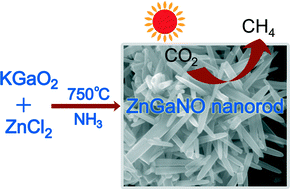Carbon dioxide (CO2) can be reduced to give methane using light, in the presence of a catalyst. This process is attractive as it provides a potential feedstock for other processes as well as removing the greenhouse gas CO2 from the atmosphere. The catalyst is key to the photoreduction, and ZnGaNO is a promising candidate as it is stable, environmentally friendly and absorbs light in the visible region, which is suitable for the reduction of CO2.
A new paper reports the synthesis of ZnGaNO nanorods by molten salt ion exchange, which represents a milder method than that used conventionally. This involves use of ZnCl2 as both a source of Zn and a molten salt. It is nitrided at 750 °C for five hours, along with KGaO2, as represented below.
The as-prepared nanorods show enhanced performance as catalysts for CO2 reduction. The rate of methane evolution is four times higher than that using ZnGaNO from solid state synthesis. As the photoreaction takes place on the surface of the catalyst, the larger surface area of the nanorods is thought to be significant. In addition, the nanorods possess a higher concentration of Zn ions owing to a lower synthesis temperature, which facilitates better energy absorption. There are also less surface defects in the nanorods, so recombination of carriers is disfavoured.
For more details, see the full paper at:
Molten salt ion exchange route to ZnGaNO single crystal nanorods for improved CO2 photoreduction to CH4
P. Zhou, S. C. Yan and Z. G. Zou
CrystEngComm, 2015, DOI: 10.1039/C4CE02198C
 |
Gwenda Kyd has a PhD in metallocarborane chemistry from the University of Edinburgh. Other research work includes the spectroscopic study of the structure of glasses and organometallic electron-transfer reactions and the preparation of new inorganic phosphors. She has recently published a book on chemicals from plants. |











